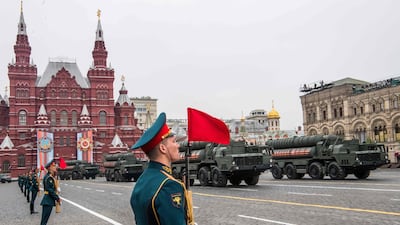Turkey has sent the first contingent of soldiers to Moscow to begin training on the Russian-built S-400 anti-aircraft system, as Ankara forges ahead with its planned purchase of the weapon despite American anger.
Turkey's Defence Minister Hulusi Akar announced the move on Wednesday, saying the officers would be only the first batch to learn how to operate the Russian hardware, with more soldiers to be sent in the coming months.
The reported $2.5 billion (Dh9.18bn) deal between Turkey and Russia, brokered in 2017, has driven a wedge between Ankara and its other Nato allies. The US says the Russian system is incompatible with those of the defence alliance and that Turkey risks sanctions by going ahead with the deal.

Turkish President Recep Tayyip Erdogan has repeatedly described the S-400 purchase as a "done deal" and dismissed US warnings that it will lose access to American F-35 fighter jets, which Turkey helps produce.
US State Department officials said on Tuesday evening that they had issued Turkey an ultimatum to withdraw from the deal with Russia within two weeks. If not, Ankara would face exclusion from the F-35 programme and be hit with sanctions passed in 2017 that apply to anyone dealing with certain Russian military intelligence entities.
Officials in Moscow have slammed Washington's efforts to dissuade Ankara from going ahead with the deal. On Wednesday morning, the Russian senator Alexei Pushkov compared Washington's deadline for Turkey to ditch the Russian deal to "the overlord threatening the vassal".
Earlier this month, Turkish officials appeared to momentarily lose their nerve over the S-400 deal, after reports that they were considering postponing delivery of the system, due in Turkey next month.
On Tuesday, Mr Akar said talks with the US over the S-400 and F-35 deals had improved but that Ankara was also preparing for potential US sanctions.
He said relevant Turkish officials were still evaluating a US proposal from late March to offer a discount on Patriot air-defence systems, the more expensive US alternative to the S-400. But the proposal "didn't meet our demands", he said, and reiterated that the contract with Russia was a "done deal".
Ties between Russia and Turkey have deepened significantly since they began military co-ordination in northern Syria in recent years. Some observers of the conflict say that because Ankara needs Russia's permission to launch attacks against Kurdish groups in Syria, Turkey may be more inclined to go along with the deal to placate Russia.
But an impending assault on the last opposition stronghold in Syria has revealed cracks in the alliance, which some observers say could spill over to the arms deal.

